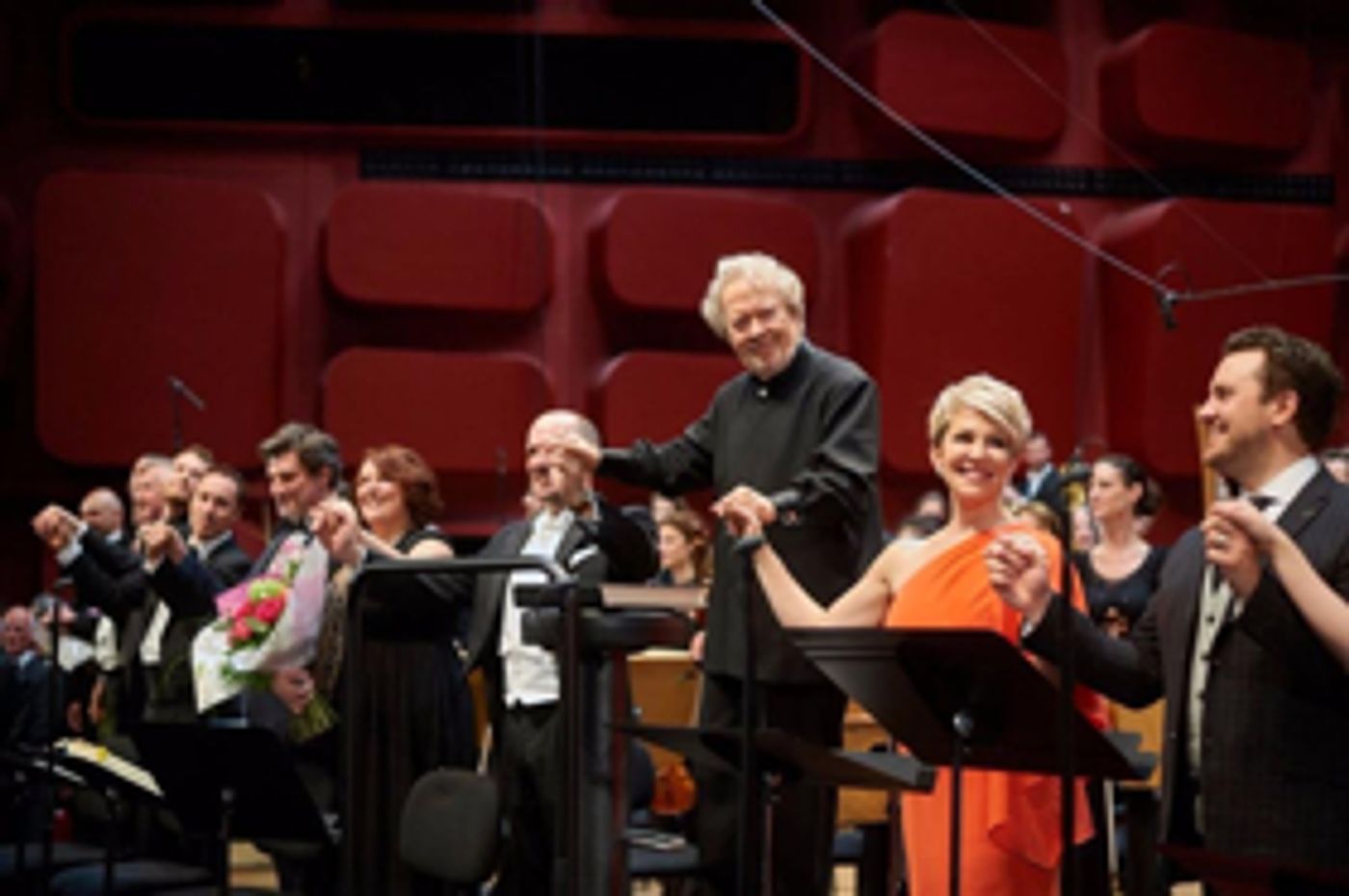Review: New TROYENS Recording with DiDonato, Spyres and Lemieux is a Horse of a Different Color

(France), with conductor Nelson surrounded by Lemieux and
Degout (l) and DiDonato and Spyres (r). Photo: Grégory Massat
Nothing beats sitting in the opera house for the thrill of hearing singers giving their all. But the new recording of Berlioz's LES TROYENS (THE TROJANS), on Warner Classics/Erato and conducted by John Nelson, comes pretty close. Taken from a couple of live concert performances in Strasbourg, France, at the Salle Erasme, with a cast headed by mezzo Joyce DiDonato as Dido (Didon, en francais), tenor Michael Spyres as Aeneas (Enee) and Marie-Nicole Lemieux as Cassandra (Cassandre)--plus that famed Trojan horse--it brings us all the chills and thrills we could want, short of being there.
The opera is a whopper--running for more than four hours and demanding huge musical forces (including six harps!)--with a story split into two parts: LA PRISE DE TROIE (The Fall of Troy) and LES TROYENS A CARTHAGE (The Trojans in Carthage). It has a libretto also by Berlioz, based on the Latin epic poem, "The Aeneid," written by Virgil between 29 and 19 BC; it tells the story of the Trojan hero Aeneas, the fall of Troy and his travels to Italy, where he became the ancestor of the Romans.

Strasbourg. Photo: Grégory Massat
LES TROYENS is considered to be a landmark of 19th century opera--though not nearly as popular as the Wagner branch of the family--and it's clear to hear why from this recording. With its mammoth choruses, invigorating ensembles and exciting solo pieces (not to mention one of the great stories from literature), it brings us a voluptuous evening of music-theatre. It's hard to imagine that this work had such a troubled, patchy history--and that the composer-librettist never heard it performed as a whole in his lifetime.
One would hope that Berlioz would have been as thrilled by this performance as the audiences in Strasbourg, hearing the soloists under Nelson with the Orchestre and Chorus of the Philharmonique de Strasbourg and no less than two more choruses, from the Opera National du Rhin in Alsace, France and the Staatsopera Karlsruhe from southwest Germany. The choruses did magnificent, seamless work in some of the composer's most difficult, and brilliant, music, while the orchestra--in this age when ensembles often seem homogenized--had real feeling for the French music.
Of the soloists--and there were more than the three already mentioned--DiDonato was surely the most elegantas the Queen of Carthage, spinning her luxurious voice into gorgeous pianissimos and absolutely spectacular in her wonderful duet with Spyres as Aeneas, though she also turned cold as ice when she felt his betrayal.
Spyres displayed a somewhat smaller voice than some tenors currently singing the role--I'm not sure that it's large enough to fill the Met, for instance--but was a heroic presence nonetheless and that love duet he sings with DiDonato, "Nuit d'ivresse," was truly superb. The role of Cassandre--the princess of Troy cursed to speak true prophecies that no one believed--dominates the first half of the opera and it was in good hands with Lemieux. Her full voice and thoughtful acting brought out the best in some of Berlioz's most dramatic moments--even stabbing herself rather than giving in to the Greeks at the end of the first half, as Troy falls.
Stanislavski might have said that "there are no small parts, only small actors," but there are also no small parts if one has a great aria, as tenor Cyrille Dubois, in the role of Iopas, proved with the sweet "O blonde Ceres," sung at the request of Dido to celebrate a victory over the enemies of the Carthage. Mezzo Marianne Crebassa [heard wonderfully in New York at Mostly Mozart last year] was Aeneas's son Ascagne, with a lovely youthful presence and tone, while baritone Stephane Degout was a thrusting presence as Chorebe, a prince bethrothed to Cassandre; bass-baritone Philippe Sly was an exciting Panthee, friend of Aeneas. There was also fine work from Stanislas de Barbeyac, as Hylas (a sailor) and Hanna Hipp as Anna, Dido's sister.
In the end, however, we must give three cheers to conductor Nelson, who was a rock-solid center of the performance--and what a performance it was!
Reader Reviews
Videos

